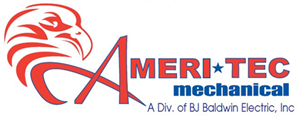Purchasing your first home is an exhilarating experience. You’re likely juggling a dozen things or more about making the right choice. We believe that gaining insight into your future HVAC system is essential. The property’s HVAC system represents a substantial investment and potential source of long-term costs, so being thorough is important for first-time homebuyers.
In the following guide, we’ll outline seven tips for learning everything you can about a home’s heating and cooling setup. And if you want a deeper opinion from the experts, consider calling Ameri-Tec. Our staff can weigh in on your options with industry insights that are second to none.
1. Which Kind of HVAC System Does the Home Use?
Start by clarifying what type of HVAC system the home features. Furnaces tend to last longer than air conditioners, and newer types of HVAC products like heat pumps boast average life spans that are even longer. Tracking down the make and specific model gives you a much better sense of how much routine maintenance it might need.
2. How Long Ago Was the System Installed?
Another good idea is to find out how old the HVAC system is when you’re considering a new home. On average, HVAC systems tend to run for about 10-12 years. Knowing when it was installed helps you anticipate future maintenance needs or when it might break down. Older systems may be more vulnerable to problems, so budgeting for a replacement unit could be necessary sooner than you thought.
3. Is the Warranty Active?
Check if the HVAC system is covered by a warranty. If it is, you’ll appreciate how it can assist with maintenance costs. HVAC warranties often cover parts and labor, but it’s important to note that details will vary. Make sure you go over any terms you don’t recognize to make sure you fully understand your coverage and any possible out-of-pocket costs.
4. When Was the Last Time It Received Maintenance?
Next, examine the maintenance history of the HVAC system, if the records are available. This kind of information can reveal if there have been regular problems or how much upkeep was provided. Inquire about key tasks like filter changes, which can indicate it received regularly scheduled tune-ups.
5. Do You Know Its Energy Efficiency Ratings?
Selecting a system with strong energy efficiency isn’t just smart; it leads to more manageable utility bills and a smaller environmental impact. Try and find the seasonal energy efficiency ratio (SEER) ratings for air conditioning as well as the annual fuel utilization efficiency (AFUE) for furnaces. High SEER ratings mean more efficient cooling throughout the season, while high AFUE ratings indicate that the fuel is more effectively burned for useable heat.
6. Can You Spot Trouble During Your Inspection?
Even if you don’t have experience in HVAC systems, you can still take a moment to check out the HVAC system on your own. Watch closely for signs of problems that haven’t been mentioned by the seller. This might consist of odd sounds, stubborn patches of the house that are too hot or cold and attempts to cover up any obvious damage.
7. Have You Asked Your Local HVAC Professional?
If you’re still hesitant to make an offer because of the current state of the HVAC system, it’s beneficial to get an assessment and recommendation from certified HVAC professionals. They are skilled at identifying things you may not know about, including refrigerant leaks, bad electrical connections or flawed ductwork.
A Call with Ameri-Tec Simplifies Your Home-Buying Journey
Selecting your first home is meant to be a joyful event, and Ameri-Tec will do everything possible to ensure that doesn’t change. Reach out with us at 717-844-9228. We can go over the details about how our HVAC services help make this process smoother, giving you what you need to step into your new home with confidence.
